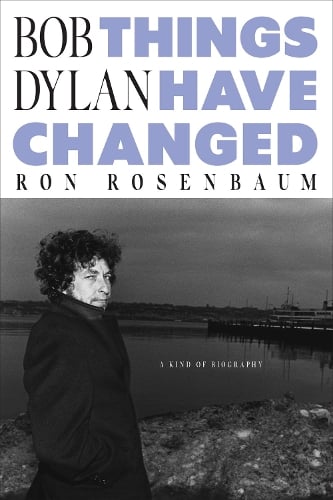Bob Dylan: Things Have Changed by Ron Rosenbaum
Published by Melville House
Publication date: 23rd October 2025
Ron Rosenbaum describes Bob Dylan: Things Have Changed as “A Kind of Biography”. As he says in the book’s preface, “don’t expect a chronology of biographical facts.” The focus is on Dylan’s journey as a songwriter and the cultural impact of his work.
A Turkish radio station on which two philosophy professors do nothing but discuss Dylan all day long is mentioned in Ron Rosenbaum’s Bob Dylan: Things Have Changed. Rosenbaum would, I suspect, be an eager participant in such a programme. His book on Dylan is a serious, wide-ranging one that explores, among other things, good versus evil, sincerity versus authenticity, and theodicy in Dylan’s work. (Theodicy concerns God’s justice in establishing a world in which evil exists.) It’s also a provocative and outspoken book.
Rosenbaum’s marathon interview with Dylan in 1977, which stretched over days, provides a springboard for his reflections in the book. The interview took place at a pivotal point in Dylan’s life. He had split from his wife, Sara; a custody battle between them was ongoing; he was editing hundreds of hours of footage for the film Renaldo and Clara, which proved to be a commercial flop; and he was on the cusp of his controversial conversion to evangelical born-again Christianity. That conversion was hugely problematic for Rosenbaum, and the book is a kind of biography of him, too.
Dylan’s turning to Christianity in the late 1970s is a central preoccupation in the book. Rosenbaum says that the conversion was “one of the most shocking instances of brainwashing in American popular culture”—that Dylan’s “soul” was stolen, and he was turned into “a robotic preaching automaton” who produced “sterile … scolding … mean-spirited” songs. Dylan, Rosenbaum argues, never quite came back from this—and Rosenbaum barely paid attention to him for years afterwards. He concedes that there is “elusive, seductive magic” in Dylan’s later songwriting and cites songs such as Blind Willie McTell and Mississippi to prove his case, but his point is that something was irretrievably lost when Dylan became “a lapdog of dogmatists”.
Rosenbaum’s rejection of the idea that there is a continuum that unites Dylan’s pre-conversion output and post-conversion output is, of course, questionable. Songs such as Masters of War from 1963 and Positively 4th Street from 1965 are as blatantly disdainful and “scolding” as any of Dylan’s Christian songs, and there’s demonstrably a continuum of quality (as opposed to defiant rage) in albums such as Oh Mercy from 1989, “Love And Theft” from 2001 and Rough and Rowdy Ways from 2020. Rosenbaum might abhor Dylan’s Christian phase; critics such as Christopher Ricks and Aidan Day, on the other hand, have provided more nuanced and balanced judgments of Dylan’s output between 1979 and 1981. Rosenbaum sees only a “ranting scold” brainwashed by “Jesus freaks”. As he says, “I’m not the forgiving type.”
Still, Rosenbaum raises many fascinating questions about Dylan’s work. Perhaps Dylan’s lasting legacy, he suggests, will be in what “we can hear in the way we speak, in the default attitude of deadpan sarcasm” that originated in the mainly Jewish group of writers and entertainers who came out of the 1960s, of whom Dylan was the most prominent and influential. That attitude of sarcasm and disdain, he argues, has been perpetuated by, for instance, pop culture, Saturday Night Live and punk. “Dylan,” he argues, “has remade American speech, American thought, American attitude.”
The attitude is perpetuated by Rosenbaum himself. His targets in the book are numerous. Dylan’s first album is contemptuously dismissed: “you could throw it in the trash. It’s all copycat stuff.” His so-called “Sinatra cover albums” are “painfully mediocre”. Woody Guthrie’s songs probably hardly move people “beyond a little toe tapping”. Allen Ginsberg is “a kind of aesthetic con man/parasite in relation to Dylan … A groupie who clothed himself in Buddhist gravitas in order to insinuate himself into Dylan’s graces”. The Swedish Academy, which awards the Nobel Prize in Literature—Dylan, of course, famously won the Nobel Prize in Literature in 2016—are “a stodgy crew of Nordic dignitaries”. Rosenbaum isn’t one to sit on the fence.
Bob Dylan: Things Have Changed is a stimulating, challenging and worthwhile read. Its scope is broad, and Rosenbaum’s opinions are forthright and absorbing, if not always persuasive.
~
Bob Dylan continues his Rough and Rowdy Ways tour in the UK from 7 November.
Bob Dylan: Things Have Changed can be found at Waterstones.
Words by Stuart Kay.
A Plea From Louder Than War
Louder Than War is run by a small but dedicated independent team, and we rely on the small amount of money we generate to keep the site running smoothly. Any money we do get is not lining the pockets of oligarchs or mad-cap billionaires dictating what our journalists are allowed to think and write, or hungry shareholders. We know times are tough, and we want to continue bringing you news on the most interesting releases, the latest gigs and anything else that tickles our fancy. We are not driven by profit, just pure enthusiasm for a scene that each and every one of us is passionate about.
To us, music and culture are eveything, without them, our very souls shrivel and die. We do not charge artists for the exposure we give them and to many, what we do is absolutely vital. Subscribing to one of our paid tiers takes just a minute, and each sign-up makes a huge impact, helping to keep the flame of independent music burning! Please click the button below to help.
John Robb – Editor in Chief






Leave a Reply